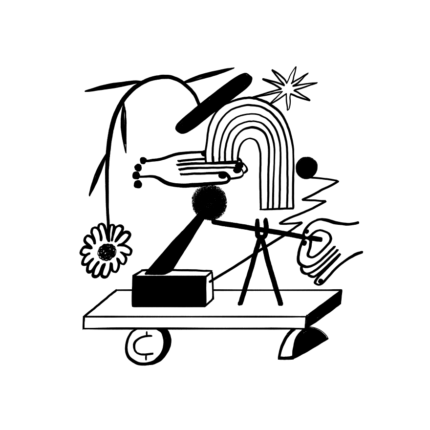
A BK-based psychologist on her lifelong mental health journey and therapy’s post-pandemic rise
The daughter of a therapist, mental health awareness has always been a cornerstone of Dr. Alexandra Jacowitz’s life. And in March of 2020, she noticed a pandemic-provided shift: the rest of the world began to pay attention to mental health, too.
The first thing you’ll see on Dr. Alexandra Jacowitz’s website—after being greeted by her smiling face, that is—are these words: “Our emotions (or lack thereof) can communicate powerful information about our lives.”
In the past year and a half especially, I have personally come to find a great deal of truth in this sentiment.
The pandemic cut us off and brought us together. It forced onto us new modes of communication—demanding some to take weekly Zoom happy hours and one-off FaceTime dates from our childhood bedrooms. Not exactly the way we saw 2020 playing out.
Most pressingly, though, the pandemic required us to become more vulnerable not only with others, but with ourselves, too.
Family matters
Alexandra Jacowitz, PsyD Co-Founder & Clinical Director of The Park Slope Psychotherapy Group is a powerful communicator and emotive individual. I know this because Ali, as I better know her, is a personal friend.
However, if you were to book a session and sit across the table from Dr. Jacowitz for the very first time, you’d soon find this to be true for yourself, too.
The daughter of a therapist, Ali always knew she’d become one herself.
“My mom, who’s now also my business partner, is an LCSW [licensed clinical social worker], and I grew up very aware of that,” she laughed as Ali and I began our FaceTime interview earlier this month.
“I often think about how some kids don’t really know what their parents’ jobs are. Not so much in the Jacowitz household… My parents met working at an inpatient unit, actually.”

“I grew up in an environment where we were always making sense of how the little pieces of something fit into the larger whole. We communicated a lot. Intellectualized how we were feeling and why.”
This type of childhood is rare, Ali admits, recalling the time she and her sister learned that feelings and thoughts are different and should be treated as such. Something I just found out about this year (thank you, therapy).
“Sort of a funny thing for a 10-year-old to think critically about,” she says after a considerate pause.
Today, Ali doesn’t just allow those feelings to play a role in her life and work—she relies on them, telling me that making a cognizant effort to feel through something is how she prefers to understand things.


The road to Dr.
When Ali was fifteen, she traded her beach towel for a notebook and traveled from Long Island to UCLA for the summer to learn more about psychology.
Fast forward a bit and by the time she graduated college, Ali had been exploring the world of psychology for nearly six years. As much as she loved the field, Ali realized that she’d need time away from the psych-sphere before delving in full force.
She recalls for me her first years out of college which were spent “deep in corporate America. I wore suits, Julia,” she says, wide-eyed, and we laugh, since Ali’s home and office are now one in the same.
Grad school and post-doc followed, at which point Ali says she felt “entirely ready to make therapy [her] full-time job.”
“It’s okay not to be okay”
Usually, people come to Ali with a sense of urgency. Before COVID, most of her new patients were trying to work through something: a breakup, a big life decision, the loss of a loved one.
A year and a half after the pandemic began, however, Ali finds that her new and long-standing clients alike are significantly more aware of their consistent need for therapy.
“Before COVID, some people might have thought that after a few sessions, they’d gotten what they needed from me. And from themselves. They were content to move on.”
That’s almost never the case anymore. Sessions sometimes start off slowly these days, but almost always “work their way into something. There’s a sticktoitiveness in a lot of my clients now that I didn’t see before.”
Ali attributes that ‘sticktoitiveness’ to the palpable shift the pandemic provided: this newly-noticed need to listen more closely to ourselves.
“I truly believe it’s more important now than ever before that we practice really considering our emotions, and remember that it’s okay not to be okay. It’s healthy to dig into our emotions and consider what’s going on below the surface.”
Therapy is learning to feel your way through something that you’ve thought your way through your whole life.

For Ali, a big part of therapy lies in what she refers to as “the uncovering process.” She circles us back to that idea of think vs. feel and says with the confidence of someone who practices what she preaches: “Therapy is learning to feel your way through something that you’ve thought your way through your whole life.”
“[Therapy] is like getting an oil change”
COVID has forced many of us to sit with ourselves in ways we never had to before. Without the distractions. Without the predetermined trajectory that suddenly every single person in the world felt veer off course last March.
“Therapy isn’t easy; it’s kind of like getting an oil change. It’s imperative to remember that these feelings are going to come out one way or another. If you ignore them, they’re likely to explode.”
Ali and I talk about how it has felt, with the onset of COVID and quarantine, that people’s perception of therapy is changing. Slowly but surely.
“My hope as a mental health professional is that people take this moment, where therapy feels like it’s at its least stigmatized and most accessible ever, and run with it. Therapy is a long game. It gives you the tools to succeed, but you’ve got to put in the work.”


